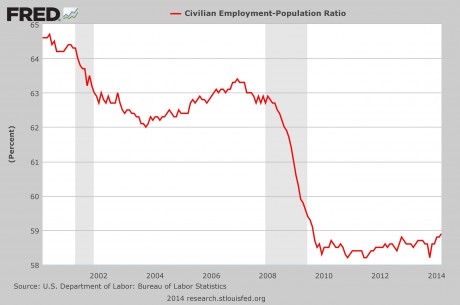A World Without Jobs
Low-cost production will mean the
end of jobs
by Liz Else
The internet and low production
costs will free us from work and want, says social theorist Jeremy Rifkin – but what will we do
then?
 Stephen Jay
Gould called an early book of his "a cleverly constructed tract of
anti-intellectual propaganda masquerading as scholarship". In the 30 years since, Jeremy
Rifkin has been preparing governments, corporations and the readers of
virtually every globally important broadsheet for a distinctly post-capitalist
future.
Stephen Jay
Gould called an early book of his "a cleverly constructed tract of
anti-intellectual propaganda masquerading as scholarship". In the 30 years since, Jeremy
Rifkin has been preparing governments, corporations and the readers of
virtually every globally important broadsheet for a distinctly post-capitalist
future.
Neither a
number-cruncher nor a utopian visionary, Rifkin occupies high ground all his
own on the futurological landscape – and the view he's getting from there now
is surprisingly bright.
Your book is called The Zero Marginal Cost Society. Why?
Marginal cost is the cost of producing an additional unit of something after the fixed costs of production have already been absorbed. Sellers look for technologies to increase productivity, and to win over consumers by offering cheaper products. But no one ever imagined that marginal costs of producing and distributing goods and services could approach zero, making the products or services potentially free and therefore beyond the market.
Is this the death of capitalism?
"Eclipse" would be a better word. Capitalism will still be around in the future as a robust, powerful niche player, but it will not be dominant.
What is driving this change?
It started over the past 15 years as millions of consumers became what I term prosumers, producing and consuming and sharing their own information goods – music, film, videos, entertainment, blogs, knowledge. This shift from consumer to prosumer devastated the music and media industries – because they have such high overheads it is very hard for them to compete. For a while, industry watchers argued that the more you give away, the more people will be interested in your premium services. But this hasn't really happened on a major scale.
Where can we see this idea of "free" gaining ground?
It is affecting the provision of energy and physical goods. And it will create extreme productivity like never before. There are over 3 billion sensors operating in the world, embedded in everything from warehouses and assembly lines right down to domestic TVs and washing machines, and they're continually feeding data to the "internet of things".
By 2030, the
US manufacturing corporation Fairchild Industries estimates there will be 100
trillion such sensors globally. Over that time, the internet of things will
evolve into three internets: for communication, energy and logistics.
Take energy.
Forty years ago, generating a watt of solar electricity cost $66. Now it costs
66 cents and the price is falling. You have to install that solar panel, wind
turbine or geothermal heat pump and pay for it, but once you pay back your
investment, you're then producing energy at near-zero marginal cost.
In Germany,
where I work with government, we see near-zero marginal costs are devastating
the power and utility companies. Only 7 per cent of new energy is coming from
big power companies; most is coming from small players, consumer cooperatives,
producer cooperatives, farmers and people living in cities.
Can big business fight back, or are these technologies somehow irresistible?
Irresistible is the right word. We've always said that the ideal efficient economy is one in which you sell at low marginal costs – but neither Karl Marx nor pioneering economist Adam Smith anticipated that these would fall to zero or near zero.
So are people right to worry about losing their jobs?
 Over the next 30 years we've got to roll out the infrastructure for these
internets. We have to put in storage technology, and convert the world's
electricity and transmission grids to an energy internet. There'll be lots of
jobs laying cables and retrofitting buildings – jobs that robots can't do yet.
And the logistics and transport industries will have to switch from internal
combustion engines to fuel cells and driverless transport. But let's be clear –
this will be our last big surge of mass employment.
Over the next 30 years we've got to roll out the infrastructure for these
internets. We have to put in storage technology, and convert the world's
electricity and transmission grids to an energy internet. There'll be lots of
jobs laying cables and retrofitting buildings – jobs that robots can't do yet.
And the logistics and transport industries will have to switch from internal
combustion engines to fuel cells and driverless transport. But let's be clear –
this will be our last big surge of mass employment.
What will happen to professional jobs?
The shift to workerless factories started in the 1960s but took 40 years to fully implement. Conceptual and knowledge workers thought they were immune, but the scary thing is, their jobs are going faster than those on the factory floor. Algorithms and analytics are knocking out lawyers, radiologists and accountants everywhere.
So how are we going to eat?
The thing is, as people in their hundreds of millions start producing their own energy and physical goods, they need less income. The old distinctions between being a seller, a buyer, an owner or a worker break down. There are still going to be a lot of goods and services that are not free, so you'll still need jobs.
What kind of jobs will still be needed?
There's an institutional mechanism we all use every single day to obtain an array of goods and services provided by neither government nor private enterprise. Economists, when they factor it into their thinking at all, call it the not-for-profit sector, but it's bigger than that. It covers everything from producing and sharing things to education, healthcare, day care for children, assisted living for the elderly, cultural events, sport, arts, environmental activities.
All these
activities generate social capital, so it's a huge sector, with a worldwide
revenue of $2.2 trillion – and that's only the small bit we know how to
quantify. For the past 20 years, the not-for-profit sector has been growing
faster than the private sector. More than 10 per cent of the UK, US and
Canadian workforce operates in this sector.
You've said this focus on social capital changes our thinking more
generally. How?
We're seeing the emergence of a collaborative commons alongside this social commons. A younger generation is studying in global classrooms, socialising with peers globally on Facebook or gossiping on Twitter, sharing homes, clothes and just about everything online. They are beginning to generate and share green electricity over the energy internet, and share cars, bikes and public transport on the evolving logistics internet. In the process, they are beginning to shift from an unswerving allegiance to unlimited and unrestrained material growth to a commitment to sustainable economic development.
What does this future hold for us as individuals?
The emerging new economy offers greater potential opportunity for self-development and promises more intense rewards than traditional employment. And since intelligent technology will do most of the heavy lifting in an economy centred on sustainable abundance rather than scarcity, in a half-century from now our grandchildren may look back at mass-market employment with the same disbelief with which we look upon slavery and serfdom. The idea that a human being's worth was measured almost exclusively by his or her productive output of goods, services and material wealth will seem primitive, even barbaric.
What could prevent this utopia?
Climate change – and therefore food insecurity – and cyberterrorism.
Are you optimistic we can outrun these risks?
I'm guardedly hopeful, but not naive. Our world is becoming dysfunctional, in terms of the environment we've created and the inequalities we've contrived. If we don't embark on this journey, what would be the alternative?
I'm guardedly hopeful, but not naive. Our world is becoming dysfunctional, in terms of the environment we've created and the inequalities we've contrived. If we don't embark on this journey, what would be the alternative?
- Book information
- The Zero Marginal Cost Society: The Internet of Things, the Collaborative Commons, and the Eclipse of Capitalism by Jeremy Rifkin
- Published by: Palgrave Macmillan
From New Scientist @ http://www.newscientist.com/article/dn25584-lowcost-production-will-mean-the-end-of-jobs.html?full=true
The Real Unemployment Rate:
In 20% of American Families, EVERYONE Is Unemployed
By Michael Snyder
One-fifth of the families in the entire country do not have a single member with a job. That is absolutely astonishing. How can a family survive if nobody is making any money? Well, the answer to that question is actually quite easy.
There is a reason why government dependence has reached epidemic levels in the United States. Without enough jobs, tens of millions of additional Americans have been forced to reach out to the government for help. At this point, if you can believe it, the number of Americans getting money or benefits from the federal government each month exceeds the number of full-time workers in the private sector by more than 60 million.
When I was growing up, it seemed like anyone that was willing to work hard could find a good paying job. But now that has all changed. At this point, 20 percent of all the families in the entire country do not have a single member that has a job. That includes fathers, mothers and children. The following is how CNSNews.com broke down the numbers…
A family, as defined by the BLS, is a group of two or more people who live together and who are related by birth, adoption or marriage. In 2013, there were 80,445,000 families in the United States and in 16,127,000—or 20 percent–no one had a job.
To be honest, these really are Great Depression-type numbers. But over the years “unemployment” has been redefined so many times that it doesn’t mean the same thing that it once did. The government tells us that the official unemployment rate is about 7 percent, but that number is almost meaningless at this point.
That means that more than 41 percent of all working age Americans do not have a job.
When people can’t take care of themselves, it becomes necessary for the government to take care of them. And what we have seen in recent years is government dependence soar to unprecedented levels. In fact, welfare spending and entitlement payments now make up 69 percent of the entire federal budget. For much more on this, please see my previous article entitled “18 Stats That Prove That Government Dependence Has Reached Epidemic Levels“.
And what is even more frightening is that more families are falling out of the middle class every single day. As a recent CNN article explained, approximately one-third of all U.S. households are living “hand-to-mouth”. In other words, they are constantly living on the edge of financial disaster…
About one-third of American households live “hand-to-mouth,” meaning that they spend all their paychecks. But what surprised the study authors is that 66% of these families are middle class, with a median income of $41,000. While they don’t have liquid assets, such as savings accounts or mutual fund holdings, they do have homes and retirement accounts, with a median net worth of $41,000.
“We don’t expect them to be living paycheck to paycheck,” said Greg Kaplan, study co-author and assistant professor of economics at Princeton University.
The American Dream is rapidly becoming an American
nightmare.
When I was growing up, I lived in a pretty typical middle class neighborhood. Everyone had a nice home, a couple of cars and could go on vacation during the summer. I don’t remember ever hearing of anyone using food stamps or going to a food bank. In fact, I can’t even remember anyone having a parent that was unemployed. If someone did leave a job, it was usually quite easy to find another one.
But today, the middle class is being ripped to shreds and according to one new report there are 49 million Americans that are dealing with food insecurity in 2014.
How can anyone not see what is happening to us? America is in the midst of a long-term economic decline, but the mainstream media and most of our politicians seem to think that things are better than ever. They continue to try to convince us that “business as usual” is the right path to take.
But one-fifth of the families in the entire nation are already totally unemployed.
At what point will we finally admit that what we are doing right now is simply not working?
30 percent of all families unemployed?
40 percent?
50 percent?
If we stay on the road that we are on now, things are going to continue to get worse. Millions more jobs will be shipped overseas, millions more jobs will be replaced by technology and crippling government regulations will kill millions more jobs. The middle class will continue to shrink and government dependence will continue to rise.
Most people just want to work hard, put food on the table, pay their mortgages and provide a nice life for their families.
But the percentage of Americans that are successfully able to do that just keeps getting smaller.
Wake up America.
Your middle class is dying.

From End of the American Dream @ http://endoftheamericandream.com/archives/the-real-unemployment-rate-in-20-of-american-families-everyone-is-unemployed
Learn about Basic Guaranteed Income concepts @ http://nexusilluminati.blogspot.com.au/2014/04/5-reasons-to-consider-no-strings.html
And see The Abolition of Work @ http://nexusilluminati.blogspot.com.au/2014/03/the-abolition-of-work.html
For more information about solutions to wage slavery see http://nexusilluminati.blogspot.com/search/label/wage%20slaves
- See ‘Older Posts’ at the end of each section
Hope you like this
not for profit site -
It takes hours of work every day
to maintain, write, edit, research, illustrate and publish this website from a
tiny cabin in a remote forest
Like what we do? Please give enough
for a meal or drink if you can -
Donate any amount and receive at least one New Illuminati eBook!
Please click below -
Xtra Images – http://farm9.staticflickr.com/8203/8265328649_a6705f3180_h.jpg
For further enlightening
information enter a word or phrase into the random synchronistic search box @ http://nexusilluminati.blogspot.com
And see
New Illuminati – http://nexusilluminati.blogspot.com
New Illuminati on Facebook - https://www.facebook.com/the.new.illuminati
New Illuminati Youtube Channel - http://www.youtube.com/user/newilluminati/feed
New Illuminati on Google+ @ https://plus.google.com/115562482213600937809/posts
New Illuminati on Twitter @ www.twitter.com/new_illuminati
New Illuminations –Paintings in
Light by R. Ayana @ http://newilluminations.blogspot.com
The Her(m)etic Hermit - http://hermetic.blog.com
The Prince of Centraxis - http://centraxis.blogspot.com (Be Aware! This link leads to implicate &
xplicit concepts & images!)
DISGRUNTLED SITE ADMINS PLEASE NOTE –
We provide a live link to your original material on your site (and
links via social networking services) - which raises your ranking on search
engines and helps spread your info further! This site is
published under Creative Commons Fair Use Copyright (unless an individual
article or other item is declared otherwise by the copyright holder) –
reproduction for non-profit use is permitted & encouraged, if you
give attribution to the work & author - and please include a (preferably
active) link to the original (along with this or a similar notice).
Feel free to make non-commercial hard (printed) or software copies or
mirror sites - you never know how long something will stay glued to the web –
but remember attribution! If you like what you see, please send a donation (no
amount is too small or too large) or leave a comment – and thanks for reading
this far…
Live long and prosper! Together we can create the best of all possible
worlds…
From the New
Illuminati – http://nexusilluminati.blogspot.com



Rifkin should get rid of his notion of cost all together! FREE is FREE without any consideration of COST. ENERGY produces more energy through a totally automated production and distribution process. We can do this? And what will people do after their unnecessary jobs are gone? How about this, they'll do what they LOVE!
ReplyDeletePercentages of people out of work? Well, factor in that roughly 50% of all the people are either too young, old, or disabled to work, throw in the fact that their jobs are being replaced by automation, are being outsourced to slave labor production lines in places like China etc... And we have a new oligarchy that owns everything as the rest of us are indebted to them and it's now ripe for a new revolution of the mind as we move entirely beyond the oligarchies politics and funny money altogether. The oligarchy is hoping to keep their dreams of control alive through their propaganda media and government BS programs, but their smoke and mirrors tactics won't last. They know this in so they're preparing for martial law.... Good luck as the soldiers will turn their backs on the bogus politicos in charge and will probably come at them....
ReplyDelete